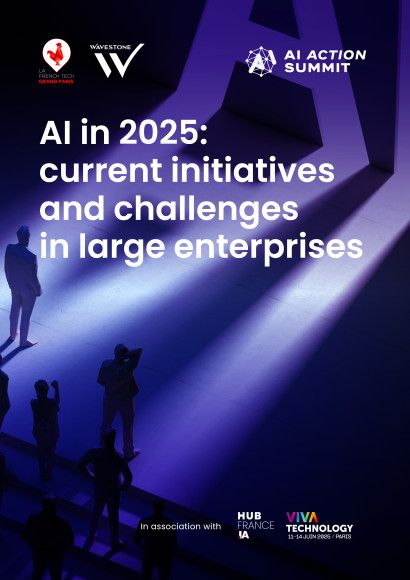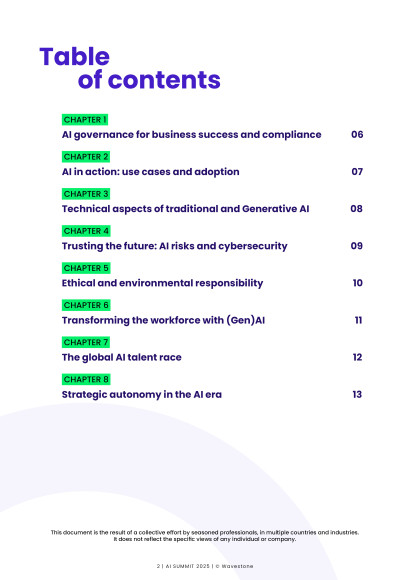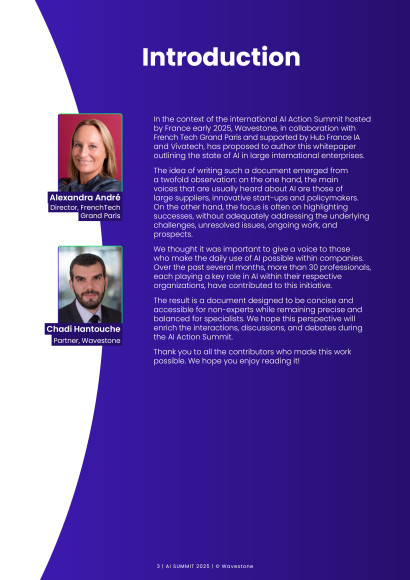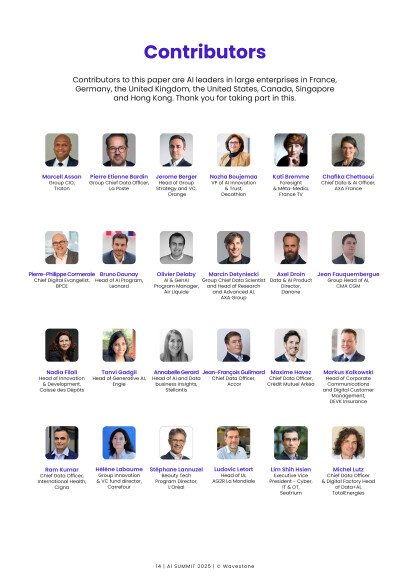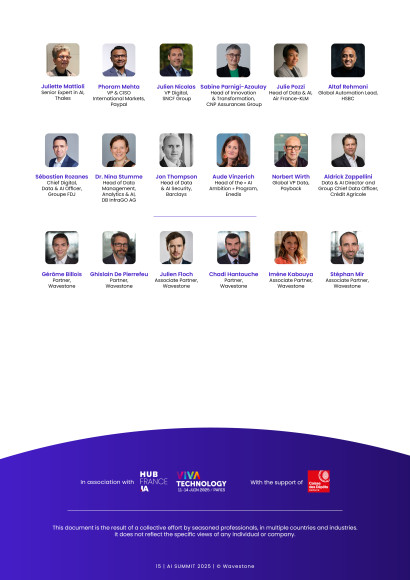AI in 2025: current initiatives and challenges in large enterprises
Published February 6, 2025
- Data & AI

Key areas of focus for 2025
The rise of Generative AI has brought companies to review their AI governance, evolving from a purely tech-driven approach to one that strategically aligns AI use cases with overarching business goals. Integrating AI with existing practices in data governance, cybersecurity, HR, and legal processes is crucial for achieving both compliance and business success. The GenAI spotlight aids in addressing longstanding Data & AI challenges. AI compliance requires a multidisciplinary approach, involving various stakeholders. The EU AI Act leads global regulations, but companies call for consistent regulations to navigate the evolving landscape effectively.
Traditional AI technologies like Machine Learning and Computer Vision have been implemented for decades, while GenAI marks a new phase, enhancing productivity and personalization. Companies are moving from proofs of concept to large-scale deployments, focusing on aligning business and technology goals. Demonstrating ROI remains complex, requiring clear metrics. Change management is crucial for adoption, addressing barriers like tool usability and perceived reliability. Balancing innovation with strategic planning ensures technological advancements align with organizational goals.
Enterprises must balance traditional AI and GenAI solutions, tailoring mixes based on specific use cases. Centralized platforms connect company data, while separate pipelines address business-specific needs. MLOps and LLMOps streamline development of AI systems, for enhanced scalability and reliability. Companies face the «Make or Buy» decision for AI models, balancing cost and customization. The future of AI is multi-modal and multi-agent, integrating voice, image, video, and text interactions to tackle complex challenges, drive innovation, and enhance operational efficiency across various sectors, ensuring seamless integration and optimal performance.
AI intensifies existing risks and introduces new threats, requiring proactive measures. Companies must combine traditional security with innovative defenses to safeguard assets. Emerging frameworks, including the EU AI Act and the NIST AI RMF, guide organizations on cybersecurity and privacy. Ensuring an adequate security posture and managing incidents involving AI models are increasingly challenging and oftentimes outsourced for the time being. Adopting a risk-based management approach balances innovation with risk awareness, enabling companies to navigate the evolving landscape of trustworthy AI effectively.
AI democratization raises ethical issues, especially with GenAI, impacting jobs and requiring ethical guidelines. Companies must address inclusion, bias, privacy, intellectual property among other topics. GenAI’s environmental impact is significant due to energy and water consumption. Companies try to promote frugal practices and green engineering strategies, like Small Language Models and environmental impact measurement. There is, nevertheless, a lack both of transparency from providers and of metrics to better measure impact. Balancing technological advancements with ethical and environmental considerations is essential for sustainable AI practices.
Traditional AI has already revolutionized business processes in the past decade, and GenAI is about to do the same with a broader workforce. Today, levels of adoption vary, with challenges in bridging knowledge gaps. Companies are deploying «Secure GPT» systems and scaling AI solutions across organizations, but the tech environment keeps changing at a rapid pace. HR must anticipate changes, redefine objectives, and address workforce impacts. Advanced training and secure AI solutions are crucial for transformation. GenAI is a catalyst for reimagining work, fostering innovation, and attracting talent, ensuring employees harness these technologies responsibly and effectively.
AI drives a global competition for talent, with significant salary and availability differences across regions. Traditional sectors and startups compete with tech giants for AI professionals. The talent shortage is due to the rapid pace of AI innovation outstripping education and training programs. Upskilling and reskilling strategies are essential. Retention involves cutting-edge projects, top technologies, and links with academia. Enhancing AI literacy among decision-makers is also vital. Collaboration between academia and industry, along with governmental support, can foster a robust AI ecosystem.
The 21st century’s global competition in AI is led by the US and China, with tech giants extending national influence. Europe lags, risking technological dependence. Companies must pursue strategic autonomy, aligning public and private interests. A clear industrial AI policy is needed, fostering local ecosystems across key sectors. Open-source AI models are also a vector of innovation and inclusiveness, by making the latest tech available to everyone. A global AI governance might be difficult to enforce in a polarized world, but seems essential to balance national and private interests, ensuring technological advancements benefit the majority.
- Data & AI
Download the full report
AI in 2025: current initiatives and challenges in large enterprisesMany thanks to the AI leaders that contributed to this paper:
- Marcell Assan, Group CIO – Traton
- Pierre Etienne Bardin, Group Chief Data Officer – La Poste
- Jerome Berger, Head of Group Strategy and VC – Orange
- Nozha Boujemaa, VP of AI Innovation & Trust – Decathlon
- Kati Bremme, Foresight & Méta-Media – France TV
- Chafika Chettaoui, Chief Data & AI Officer – AXA France
- Pierre-Philippe Cormeraie, Chief Digital Evangelist – BPCE
- Bruno Daunay, Head of AI Program – Leonard
- Olivier Delaby, AI & GenAI Program Manager – Air Liquide
- Marcin Detyniecki, Group Chief Data Scientist and Head of Research and Advanced AI – AXA Group
- Axel Droin, Data & AI Product Director – Danone
- Jean Fauquembergue, Group Head of AI – CMA CGM
- Jean-François Guilmard, Chief Data Officer – Accor
- Nadia Filali, Head of Innovation & Development – Caisse des Dépôts
- Tanvi Gadgil, Head of Generative AI – Engie
- Annabelle Gérard, Head of AI and Data business Insights – Stellantis
- Maxime Havez, Chief Data Officer – Crédit Mutuel Arkéa
- Markus Kalkowski, Head of Corporate Communications and Digital Customer Management – DEVK
- Insurance
- Ram Kumar V, Chief Data Officer, International Health – Cigna
- Hélène Labaume, Group Innovation & VC fund director – Carrefour
- Stéphane Lannuzel, Beauty Tech Program Director – L’Oréal
- Ludovic Letort, Head of IA – AG2R La Mondiale
- Michel Lutz, Chief Data Officer & Digital Factory Head of Data+AI – TotalEnergies
- Juliette Mattioli, Senior Expert in AI – Thales
- Phoram Mehta, VP & CISO International Markets – Paypal
- Julien Nicolas, VP Digital – SNCF Group
- Sabine Parnigi-Azoulay, Head of innovation & Transformation – CNP Assurances Group
- Julie Pozzi, Head of Data & AI – Air France-KLM
- Altaf Rehmani, Global Automation Lead – HSBC
- Sébastien Rozanes, Chief Digital, Data & AI Officer – Groupe FDJ
- Lim Shih Hsien, Executive Vice President, Cyber, IT & OT – Seatrium
- Dr Nina Stumme, Head of Data Management, Analytics & AI – DB InfraGo AG
- Jon Thompson, Head of Data & AI Security – Barclays
- Aude Vinzerich, Head of the “AI Ambition” Program – Enedis
- Norbert Wirth, Global VP Data – Payback
- Aldrick Zappellini, Data & AI Director and Group Chief Data Officer – Crédit Agricole
Wavestone contributors
-

Ghislain De Pierrefeu
Partner – France, Paris
Wavestone
LinkedIn -

Chadi Hantouche
Partner – France, Paris
Wavestone
LinkedIn -

Stephan Mir
Associate Partner – France, Paris
Wavestone
LinkedIn -

Gérôme Billois
Partner – France, Paris
Wavestone
LinkedIn -

Julien Floch
Associate Partner – France, Paris
Wavestone
LinkedIn -

Imène Kabouya
Associate Partner – France, Paris
Wavestone
LinkedIn
